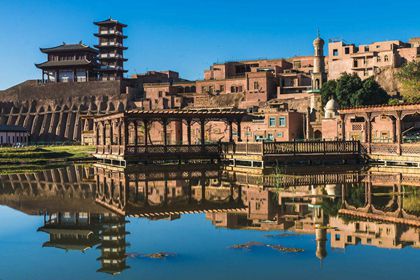Shopping in Kashgar - Unveiling the Treasures of Kashgar Bazaar
Nestled in the heart of the ancient city of Kashgar in Xinjiang, China, the Kashgar Bazaar stands as a vibrant testament to the region's rich cultural heritage and age-old trading traditions. Renowned as one of the largest and most vibrant markets in Central Asia, Kashgar Bazaar has been a hub of commercial activity for over a millennium. The bazaar, also known as the Grand Bazaar, offers an immersive experience, drawing visitors into a world of bustling alleys, intricate stalls, and a myriad of exotic goods. As one steps into this enchanting marketplace, the air is filled with the aroma of spices, the vibrant colors of textiles, and the melodious chatter of local vendors. The bazaar's allure lies not only in its wealth of goods but also in its historical and cultural significance, making it a must-visit destination for travelers seeking an authentic and enriching shopping experience.
![]()
![]()
The history and significance of Kashgar Bazaar
The history of Kashgar Bazaar dates back to the ancient Silk Road era, when the city of Kashgar served as a pivotal trading post connecting the East and the West. The bazaar's origins can be traced to over two thousand years ago, and it has since flourished as a melting pot of diverse cultures, customs, and commodities. Throughout its long and storied history, the bazaar has been a meeting point for merchants from China, Central Asia, the Middle East, and beyond, fostering the exchange of goods, ideas, and traditions. Today, the bazaar stands as a living testament to this heritage, where modern-day traders and artisans continue the age-old practices of bartering, trading, and crafting traditional wares. Its enduring significance as a center of commerce and cultural exchange has earned Kashgar Bazaar the distinction of being a UNESCO World Heritage Site, further cementing its place as a cherished symbol of the region's past and present.
Navigating through Kashgar Bazaar
As one ventures into the labyrinthine streets of Kashgar Bazaar, a sense of wonder and excitement permeates the air. The market sprawls across a vast expanse, comprising numerous interconnected alleys and squares, each offering its own array of goods and experiences. Navigating through the bazaar is an adventure in itself, with each turn revealing a new treasure trove of handicrafts, textiles, jewelry, and culinary delights. The sprawling marketplace is divided into sections dedicated to specific goods, such as the renowned carpet and rug section, where intricately woven masterpieces adorn the floors and walls, or the spice market, where an aromatic medley of exotic herbs and seasonings tantalizes the senses. Visitors can also explore the vibrant livestock market, where livestock traders converge to showcase and trade a diverse array of animals, adding a unique and authentic dimension to the bazaar's bustling atmosphere. If you are interested in shopping, there is also a famous bazzar in Urumuqi called Urumuqi International Grand Bazzar that you can pay a visit to.
Unique treasures and exotic finds
Kashgar Bazaar is a treasure trove of unique and exotic finds, offering an eclectic assortment of goods that reflect the region's diverse cultural influences and artisanal traditions. One of the bazaar's most iconic offerings is its collection of vibrant textiles and carpets, meticulously handcrafted by local artisans using age-old techniques passed down through generations. These intricate tapestries and rugs not only serve as decorative pieces but also encapsulate the rich tapestry of Xinjiang's artistic heritage. Additionally, the bazaar is renowned for its dazzling array of jewelry, including ornate silverwork, delicate filigree, and vibrant gemstones, each piece a testament to the region's skilled metalworkers and lapidaries. Beyond these traditional crafts, the bazaar also boasts an assortment of unique and unexpected treasures, from antique trinkets and tribal artifacts to exotic spices, teas, and traditional medicines, each offering a glimpse into the region's cultural mosaic.
![]()
![]()
Tips for shopping at Kashgar Bazaar
Navigating the bustling thoroughfares of Kashgar Bazaar can be an exhilarating yet daunting experience, especially for first-time visitors. To make the most of their shopping expedition, travelers can benefit from a few practical tips to ensure a rewarding and enjoyable experience. Firstly, it is advisable to arrive early in the morning when the bazaar is at its liveliest, with vendors setting up their stalls and the day's hustle and bustle commencing. This early start not only allows visitors to beat the crowds but also presents the opportunity to witness the bazaar coming to life at the break of dawn. Additionally, haggling is an integral part of the shopping culture at Kashgar Bazaar, and visitors should feel comfortable negotiating prices with vendors, keeping in mind that a friendly and respectful approach often yields the best deals. Furthermore, exploring the bazaar with an open mind and a spirit of curiosity can lead to unexpected discoveries and interactions, as some of the most memorable experiences at the market arise from spontaneous interactions with local artisans and traders.
Experiencing the local culture at the bazaar
Beyond its role as a commercial hub, Kashgar Bazaar serves as a vibrant nexus of cultural exchange, where visitors can immerse themselves in the region's rich traditions and customs. The bazaar provides a captivating showcase of Uyghur culture, with its lively folk music, traditional dances, and colorful attire adding to the sensory tapestry of the market. Visitors can witness artisans at work, skillfully crafting traditional wares such as pottery, woodwork, and intricate textiles, offering a firsthand glimpse into the time-honored craft traditions of the region. Moreover, the bazaar's culinary offerings provide a delectable window into the local cuisine, with an array of aromatic street foods, traditional sweets, and refreshing beverages tempting the taste buds of visitors. By engaging with the local culture at the bazaar, travelers can gain a deeper appreciation for the heritage and identity of the Uyghur people, fostering meaningful connections and understanding amidst the vibrant tapestry of the market.
![]()
![]()
Authenticity and ethical shopping
In an age of mass production and globalized commerce, the quest for authenticity and ethical shopping has become increasingly important for conscientious consumers. At Kashgar Bazaar, authenticity is deeply ingrained in the fabric of the market, with many of the goods on offer being handcrafted by local artisans using traditional methods and materials. This commitment to authenticity not only ensures the preservation of cultural heritage but also contributes to the sustainability of artisanal practices and local economies. Visitors to the bazaar can take pride in supporting ethical shopping practices by directly engaging with artisans and independent traders, knowing that their purchases directly benefit the livelihoods of the individuals behind the goods. By prioritizing authenticity and ethical considerations in their shopping endeavors, visitors can not only acquire unique and meaningful souvenirs but also contribute to the preservation and perpetuation of the vibrant cultural legacy embodied by Kashgar Bazaar.
![]()
![]()
Preserving the heritage of Kashgar Bazaar
As a living testament to centuries of trade, craftsmanship, and cultural exchange, Kashgar Bazaar holds a significant place in the collective heritage of the region and the world at large. The preservation of this cultural treasure is of paramount importance, requiring the concerted efforts of local authorities, communities, and visitors alike. Initiatives aimed at safeguarding the architectural integrity of the bazaar, preserving traditional artisanal skills, and promoting sustainable tourism practices are essential for ensuring the longevity of this iconic market. Furthermore, raising awareness about the historical and cultural significance of Kashgar Bazaar can foster a deeper sense of appreciation and respect for its heritage, encouraging responsible visitation and engagement with the local community. By actively participating in efforts to preserve the bazaar's legacy, visitors can contribute to the safeguarding of an invaluable cultural asset for future generations to cherish and enjoy.
Must-try local delicacies at the bazaar
A visit to Kashgar Bazaar is incomplete without indulging in the tantalizing array of local delicacies that grace its bustling thoroughfares. From savory street foods to delectable desserts, the bazaar offers a culinary adventure that delights the palate and satisfies the senses. Among the must-try delicacies is the renowned Uyghur lamb kebab, a succulent skewered delicacy infused with aromatic spices and grilled to perfection over open flames. For those with a sweet tooth, the bazaar's selection of traditional sweets, such as the flaky and fragrant Xinjiang naan bread and the rich and creamy local yogurt, offer a delightful taste of Uyghur dessert traditions. Additionally, the bazaar's tea houses and refreshment stalls serve a variety of fragrant teas, refreshing fruit juices, and invigorating beverages, providing the perfect respite from the excitement of shopping. Sampling these local delicacies not only offers a culinary journey through Uyghur flavors but also provides an opportunity to savor the bazaar's vibrant gastronomic culture. Check Famous Restaurants in Kashgar.
![]()
![]()
A visit to Kashgar Bazaar is a journey into the heart of Xinjiang's cultural tapestry, where the echoes of ancient trade routes and the vibrancy of Uyghur heritage converge in a whirlwind of sights, sounds, and scents. As travelers navigate through its labyrinthine alleys and immerse themselves in its kaleidoscope of treasures, they become part of a living legacy that transcends time and borders. By embracing the spirit of exploration, cultural exchange, and ethical engagement, visitors to Kashgar Bazaar can not only unearth exotic finds and immersive experiences but also contribute to the preservation and celebration of a heritage that continues to thrive amidst the modern world. Whether seeking rare handicrafts, savoring local flavors, or simply reveling in the bazaar's timeless allure, a sojourn through the treasures of Kashgar Bazaar promises an unforgettable odyssey through the soul of Central Asia. Join in our 8 Days Kashgar-Urumuqi-Turpan Group Tour to enjoy the lively Xinjiang with us!

 Flow us
Flow us






